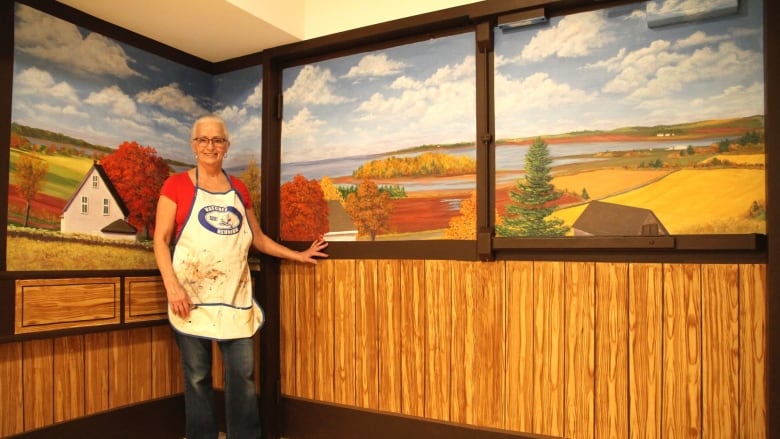How this art prevents patients from wandering
'They don't see the door, so they're not trying to get out the door'

Lorraine Vatcher has been a painter for 17 years, but she'd never been asked to paint doors before.
Vatcher is just putting the finishing touches on a large mural that stretches across the doors out of the dementia unit at Dr. John Gillis Memorial Lodge in Belfast, P.E.I.
There's just so many reasons that it's value-added for someone with dementia.— Corrine Hendricken-Eldershaw
"It serves more than one purpose," explained Vatcher. "It's not just esthetic — it's also the fact that unfortunately with dementia residents, they have a tendency to want to go home, and those doors are synonymous with home."
Camouflaging the doors helps calm the agitation patients can feel when they see doors.
Research-based
"I think it's wonderful and it really links back to some very clear evidence-based research," said Corrine Hendricken-Eldershaw with the Alzheimer Society of P.E.I.

Murals in dementia units are a growing trend the society is encouraging — the disease limits patients' vision, so the colours in the murals can be stimulating, while a familiar, friendly scene or vista can also be soothing and trigger positive feelings.
"There's just so many reasons that it's value-added for someone with dementia," said Hendricken-Eldershaw.
Some facilities apply vinyl wall decals of landscape photography that are also effective on doors, she said. "Anything that creates home ... and community ... is important."
'Learned to love them'
Vatcher created the scene in consultation with staff and residents at the lodge. It's a vista of the nearby coastal community of Orwell, and Vatcher cleverly painted the doors to resemble the view out a bay window. She even painted the lower walls to look like wood panelling.

She took many photos of the area and included some area landmarks including an iconic P.E.I. farmhouse and the Point Prim lighthouse.
She's spent from five to seven hours per day for the last four weeks on the project, calling it "so enjoyable" — even though the doors she was painting were in frequent use by staff.
Residents came and watched her work, some of them chatting with her, some just observing quietly.
"I learned so much about them, and learned to love them very much," Vatcher said.
'Working quite well'
Gillis Lodge's owner Douglas MacKenzie said staff told him about the benefits of murals for dementia patients.

"They don't see the door, so they're not trying to get out the door," MacKenzie said. "This is very functional."
As news spreads, MacKenzie believes more dementia care facilities will add murals.
"We're kind of doing an experimental thing," he said, adding, "It seems to be working quite well so far ... I don't think there's been one instance where they're trying to open that door, because it doesn't look like a door."
There are 90 residents at the lodge and 12 in the dementia unit, which is full.
MacKenzie loves Vatcher's work — especially the fact that the scene is a local one — and plans to hire her to paint more murals in other areas at the home, he said.

